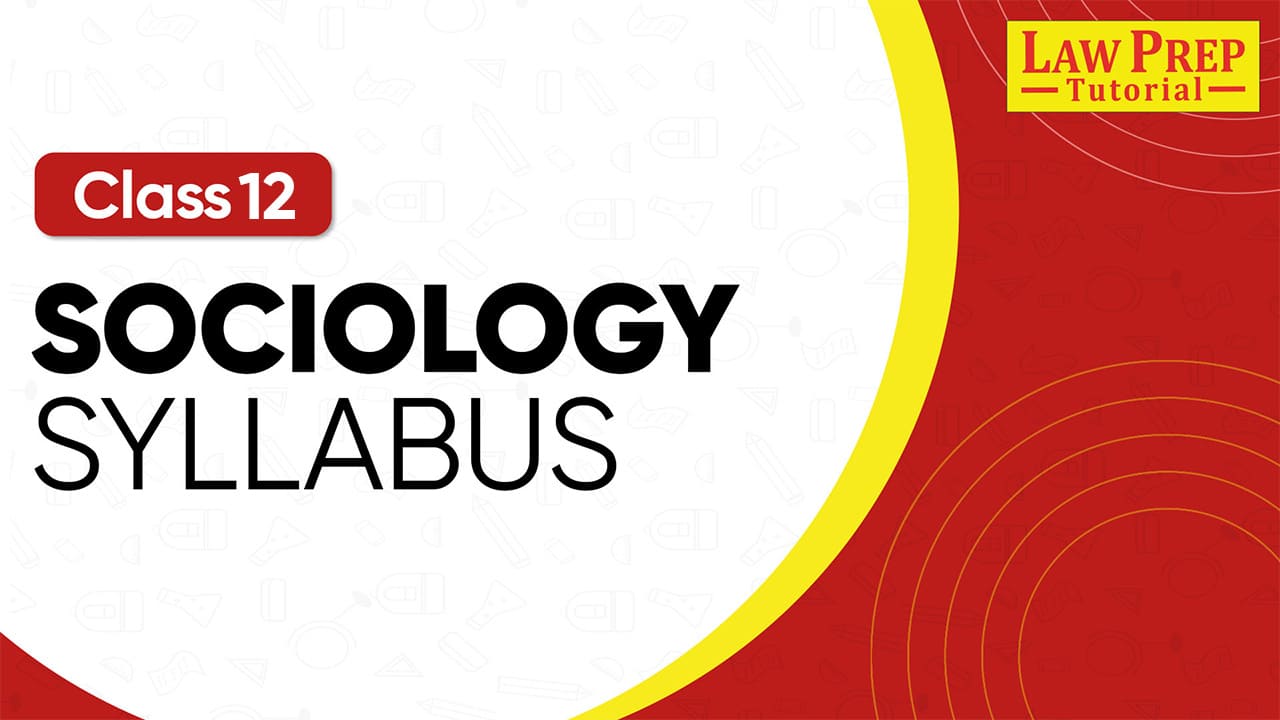The CBSE Class 12 Sociology syllabus 2026-27 offers a deeper understanding of Indian society, its institutions, and the processes of change shaping our world today. Building on the basics learned in Class 11, the syllabus explores themes such as social inequality, cultural change, democracy, globalization, and social movements.
The syllabus of sociology for class 12 CBSE equips students with analytical skills, critical thinking, and awareness of contemporary issues. We have shared the complete Class 12 Sociology syllabus, exam pattern, prescribed books, objectives, preparation tips, project ideas, and a PDF download for your convenience.
Class 12 Sociology Syllabus 2026-27: Overview
Below is the highlights of class 12th syllabus for sociology:
| Part | Units | Marks |
| A. Indian Society | 1. Introducing Indian Society 2. The Demographic Structure of the Indian Society 3. Social Institutions – Continuity and Change 4. The Market as a Social Institution 5. Patterns of Social Inequality and Exclusion 6. The Challenges of Unity in Diversity | 32 |
| B. Change and Development in Indian Society | 7. Structural Change 8. Cultural Change 9. The Story of Indian Democracy 10. Change and Development in Rural Society 11. Change and Development in Industrial Society 12. Globalization and Social Change 13. Mass Media and Communications 14. Social Movements | 48 |
| Total (Theory) | 80 Marks | |
| Project Work | 20 Marks | |
| Grand Total | 100 Marks |
📥Download Class 12 Sociology Syllabus PDF 2026-27
For quick reference, here is the official CBSE Class 12 Sociology Syllabus PDF 2026-27.
Class 12th Sociology Syllabus 2026-27: Part A
Part A: Indian Society
The first part of the Class 12 Sociology syllabus 2026-27 focuses on understanding Indian society in depth. It explores themes such as the demographic structure of India, social institutions, markets, inequality, and the challenges of unity in a diverse country.
These units help students critically examine the unique features of Indian society, its strengths, and its challenges. By studying this section, learners not only understand how social institutions function but also how traditions adapt to modern changes.
This part lays a strong base for analyzing the complex nature of Indian society in today’s globalized world.
| Unit | Topics Covered |
| Unit 1: Introducing Indian Society | • Plural perspectives on Indian society • Colonialism, nationalism, and modernization • Social institutions and practices in India |
| Unit 2: The Demographic Structure of the Indian Society | • Population size and growth • Demographic features: birth rate, death rate, fertility rate • Age structure, sex ratio, rural-urban composition • Demographic dividend |
| Unit 3: Social Institutions – Continuity and Change | • Family, marriage, and kinship in India • Caste system and its features • Tribe and society • Changing patterns of institutions |
| Unit 4: The Market as a Social Institution | • Concept of market as a social institution • Weekly markets, local trade, and rural markets • Colonialism and emergence of new markets • Globalisation and markets |
| Unit 5: Patterns of Social Inequality and Exclusion | • Social inequality and its forms • Caste-based and class-based inequalities • Marginalization and exclusion • Discrimination faced by women, Dalits, tribals, and minorities |
| Unit 6: The Challenges of Unity in Diversity | • Diversity in India: regional, linguistic, religious, and cultural • Communalism, regionalism, casteism • Challenges to national integration • Role of Constitution in maintaining unity |
More Important Resources for CBSE Exam:
| Class 11th Hornbill Syllabus | CBSE Class 11th Commerce Subjects |
| CBSE Full Form | All about CBSE Class 11th |
| Class 11th Syllabus | Class 12th Syllabus |
| Class 11th Commerce Books | CBSE Board: All details |
Class 12th Sociology Syllabus 2026-27: Part B
Part B: Change and Development in Indian Society
The second part of the Class XII Sociology syllabus 2026-27 highlights the processes of change and development shaping modern India. It explains how structural and cultural changes have influenced democracy, rural and industrial society, globalization, media, and social movements.
These units provide students with the tools to analyze contemporary issues like industrialization, urbanization, globalization, and the role of mass media. By understanding these themes, learners can connect classroom knowledge with real-life developments in Indian society.
This part is crucial for building awareness about ongoing transformations and their impact on individuals, communities, and the nation.
| Unit | Topics Covered |
| Unit 7: Structural Change | • Colonialism, industrialization, and urbanization • Modern education system • Processes of modernization and secularization |
| Unit 8: Cultural Change | • Social reform movements • Gender and social change • Impact of westernization, sanskritization, and globalization |
| Unit 9: The Story of Indian Democracy | • Constitution and democracy • Political parties and elections • Challenges to Indian democracy • Role of citizens in democracy |
| Unit 10: Change and Development in Rural Society | • Agrarian structure and change • Green Revolution and its impact • Rural development programs • Changing rural livelihoods |
| Unit 11: Change and Development in Industrial Society | • Industrialization and urbanization • Organized and unorganized sectors • Globalization and new economic policies • Changing labour relations |
| Unit 12: Globalization and Social Change | • Meaning and dimensions of globalization • Cultural and economic impacts of globalization • Globalization and inequality • Responses to globalization |
| Unit 13: Mass Media and Communications | • Growth of mass media in India • Role of print and electronic media • Social media and its impact • Media, democracy, and public opinion |
| Unit 14: Social Movements | • Meaning and features of social movements • Peasant and tribal movements • Women’s movements • Dalit movements • Ecological/environmental movements |
CBSE Class 12 Sociology Syllabus: Exam Pattern
The Class 12 Sociology exam is designed to test students’ conceptual clarity, analytical ability, and ability to apply sociological perspectives to real-life situations. The paper will include a variety of questions – Very Short Answer, Short Answer, and Long Answer types. Internal choices are provided in some questions.
- Theory Exam: 80 Marks
- Project Work: 20 Marks
- Total: 100 Marks
- Duration: 3 Hours
Question Paper Design:
| Typology of Questions | Objective | Marks | Weightage |
| Remembering & Understanding | Recall facts, terms, concepts, definitions, ideas | 24 | 30% |
| Applying | Use knowledge, facts, techniques in new situations | 24 | 30% |
| Analysing, Evaluating & Creating | Compare, contrast, examine, classify, interpret, judge, draw conclusions | 32 | 40% |
| Total | 80 | 100% |
Question Format:
- Paper will have around 16–18 questions.
- Both Parts A (Indian Society) and Part B (Change and Development in Indian Society) will be covered.
- Internal choice will be provided in long answer type questions.
Explore the updated CBSE Class 12 syllabus for all subjects here:
Prescribed Books for CBSE Class XII Sociology Syllabus 2026-27
Students must follow the NCERT textbooks prescribed by CBSE for Class 12 Sociology. These books are the main source for preparing concepts, exam answers, and project work.
- Indian Society – Class XII (Published by NCERT)
- Social Change and Development in India – Class XII (Published by NCERT)
These books provide detailed explanations, examples, case studies, and exercises that cover the entire syllabus. They are essential for CBSE board exam preparation and also serve as a foundation for higher studies in humanities and social sciences.
Objectives of Class 12 Sociology Syllabus 2026-27
The Class 12 Sociology syllabus is designed to help students critically engage with Indian society and understand the processes of change shaping it. The main objectives are:
- Deepen understanding of Indian society through study of its institutions, structures, and cultural practices.
- Examine social inequalities and exclusions in terms of caste, class, tribe, gender, and region.
- Analyze social change and development in rural, urban, industrial, and global contexts.
- Study democratic processes and social movements that shape modern India.
- Encourage sociological thinking by linking personal experiences with larger social realities.
- Develop research and analytical skills to interpret contemporary issues scientifically.
- Promote sensitivity and responsibility towards diversity, environment, and national integration.
Tips to Prepare for Class 12 Sociology Syllabus
1. Stick to NCERT Books
The prescribed NCERT textbooks Indian Society and Social Change and Development in India cover the entire syllabus. Read them thoroughly as most exam questions come directly from NCERT.
2. Highlight Key Thinkers and Case Studies
Focus on contributions of Indian and Western sociologists, and note down examples or case studies given in the chapters for better answers.
3. Make Concept Maps
Create flowcharts and diagrams for topics like social change, globalization, or social movements. Visual learning helps in quick recall during exams.
4. Practice Previous Year Papers
Solving past board papers will help you understand the question pattern and time management.
5. Revise Regularly
Keep revising terms, definitions, and theories weekly. Regular revision avoids last-minute cramming.
6. Prepare Well for Projects
The project carries 20 marks, so choose a meaningful topic, collect relevant data, and present it neatly with charts, graphs, and proper analysis.
7. Use Real-Life Examples
Relating sociological concepts like caste, gender, or globalization to current events makes your answers stronger and more relatable.
Project Work Syllabus for Class 12 Sociology
Project work in Sociology carries 20 marks and is a vital part of the internal assessment. It encourages students to apply sociological concepts to real-life situations through observation, surveys, and analysis.
Suggested Topics for Project Work:
- Impact of globalization on youth culture.
- Study of changing family patterns in urban and rural areas.
- Women’s empowerment and gender roles in your community.
- Role of Panchayati Raj Institutions in rural development.
- Unemployment and informal sector workers in local society.
- Study of religious diversity and interfaith harmony.
- Analysis of media influence on society.
- Environmental awareness and sustainable practices in your locality.
- Caste and class dynamics in contemporary India.
- Case study on student movements or protests.
Project Work Components
- Data Collection: surveys, interviews, observations, case studies.
- Analysis: interpreting findings using sociological theories.
- Presentation: structured project file with charts, graphs, and references.
- Viva-Voce: short oral exam to test understanding of the project.
Check the latest CBSE Class 11 syllabus for all subjects below:
FAQs About Class 12th Sociology Syllabus
There are 14 units in total – 6 in Part A and 8 in Part B.
The theory paper is of 80 marks, while project work carries 20 marks, making a total of 100 marks.
Yes, project work is compulsory and carries 20 marks, including viva-voce.
Important topics include social inequality, globalization, cultural change, democracy, media, and contributions of Indian sociologists.
The syllabus emphasizes sociologists like M.N. Srinivas, Andre Beteille, A.R. Desai, and G.S. Ghurye.
Yes, Sociology helps in UPSC, CUET, and other entrance exams, as it covers social issues, change, and development.
The paper includes Very Short Answer, Short Answer, and Long Answer type questions with internal choices.
Read the chapter-wise summaries of Class 11 English here:
Find detailed questions and answers from all chapters of English Class 11 now:
Discover CLAT exam resources that can help you get started early:
Explore CLAT coaching centers across different cities:


